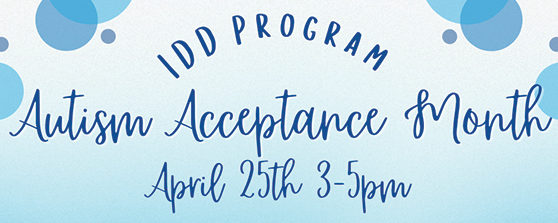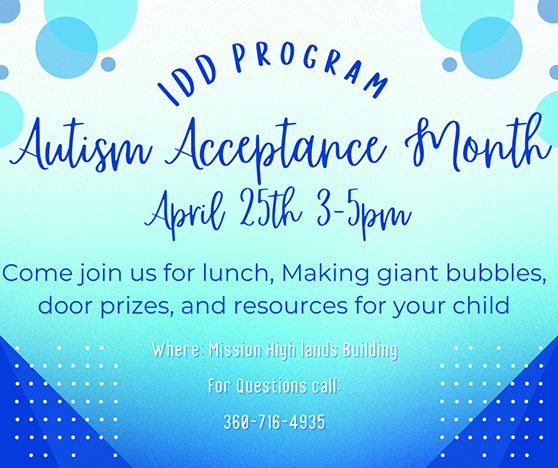
By Kalvin Valdillez, Tulalip News
A certain cartoon sponge once famously said, “We’re not just blowing bubbles, we’re making bubble art!” He quickly backed up this statement by using his special technique to conjure a butterfly from his bubble wand, while also unintentionally annoying his underwater neighbor.
As hilarity ensued in the bubble-centered Spongebob Squarepants episode, Spongebob’s unwavering fondness for sudsy orbs shined a bit of light on the important role bubbles play in brain development and cognitive function. Examples of this include patience, perception, creativity, sensory integration, visual tracking, hand-eye coordination, cause and effect, social interaction/skills, and even motor skills.
Now, though bubbles are beloved by people of all ages, children who are diagnosed with an Autism Spectrum Disorder (ASD) take a particular shine to bubble play. This is most likely because it helps fulfill so many of their sensory needs by offering an engaging and calming experience.
A few years back, in April 2012, a nonprofit called Faces 4 Autism embarked on an initiative to set a Guinness World Record for the most people blowing bubbles at the same time and invited schools and families across the nation to participate. After achieving this amazing feat, bubble play became a staple at Autism Awareness/Acceptance Month events throughout the country. And this year, the Tulalip Family Haven’s IDD program is hosting a bubble-themed gathering on April 25, to celebrate Autism Acceptance Month on the rez. Or as Spongebob would say, they are gearing up to ‘bring it around town’.
Autism is a common, yet very complex, intellectual developmental disability that has significantly been on the rise over the past few decades. According to the Centers for Disease Control and Prevention (CDC), one in thirty-six children in the United States are diagnosed with an autism spectrum disorder. That study also shows that Native children are affected at a similar rate as other races and ethnicities, but that does come with a caveat.
Because of a lack of resources on reservations and access to mental health care, many Indigenous kids are diagnosed later on in life, during their pre-teen years. In comparison, non-Native children living with ASD are typically diagnosed by the age of three. Early indicators include language delay, repetitive behavior, obsessive interests, as well as social and communication challenges. The CDC states that children living with ASD have different ways of learning, moving, paying attention, and interacting with the world around them.
Furthermore, research conducted by the American Academy of Pediatrics showed that Native youth are 13% less likely to be identified with autism in early childhood, while non-Native kids are 1.5 times as likely to receive an ASD diagnosis at a young age. And those low statistics and the lack of available knowledge surrounding IDD tends to lead to negative misconceptions, denial, and a feeling of despair once an Indigenous child is diagnosed with any form of IDD.
With the prevalence of ASD on the rise, many communities are slowly transitioning from participating in Autism Awareness Month to celebrating Autism Acceptance Month, including Tulalip.

Said Alayna Helland, IDD Case Manager at Tulalip Family Haven, “Awareness is important, but acceptance is also vital. To show acceptance of individuals with autism, it’s important to focus on everything they can do instead of focusing on what they can’t do. People with autism are often gifted with unique abilities like exceptional memory, heightened attention to detail, strong visual-spatial skills, and unique perspectives on problem solving.”
In preparation for Autism Acceptance Month, Alayna reached out to Tribal member and a parent of a child with ASD, Cara Mccoy. Cara spoke on the difficulties Tribal families face with the lack of inclusion when it comes to attending community gatherings. Cara shared, “We rarely go to the events because there are a lot of people and it’s loud. To do more things in the community, offer sensory-friendly events. Have a sensory room at the more significant events.”
The IDD Support for Families program was developed in 2023 to help Tulalip community members with an ASD or IDD diagnosis by bridging the gap between the reservation and the available resources.
The program is referral-based and takes both outside referrals, from other tribal programs and/or the Marysville School District, as well as self-referrals where a family can request services by either in-person appointments or by completing an online application on Family Haven’s Tribal department webpage. They offer their services to Tulalip tribal members as well as to other Natives who live in Snohomish County. IDD services include monthly play groups, weekly support groups, community outreach, connecting families with resources, and assistance with any applications in regard to their child’s needs such as medical, disability, and caregiving.
When asked about the importance of celebrating Autism Acceptance Month, Alayna stated, “It is important to celebrate because Studies have shown that children in Native American communities are less likely to have access to a specialist to receive a diagnosis and are less likely to have an early intervention. Early intervention is crucial for children with autism because it maximizes their potential for positive outcomes by addressing developmental challenges early, improving essential skills like communication and social interaction, and enhancing independence and overall quality of life.
“The IDD program assists in connecting families with providers that can diagnose Autism and ADHD, and it’s important that our community knows this resource exists so early intervention is possible. The IDD program holds events throughout the year that are accommodating to our community members with Autism. On April 25, we are celebrating Autism Acceptance Month at the Mission Highlands building. We will have sensory activities for the children, early dinner, and information and resources for anyone interested in the program.”
The Autism Acceptance Month bubble blast bash will take place from 3:00 p.m. – 5:00 p.m. at the Mission Highlands park on the last Friday of April. For more details about the IDD program or the upcoming gathering, please contact (360) 716-4935.